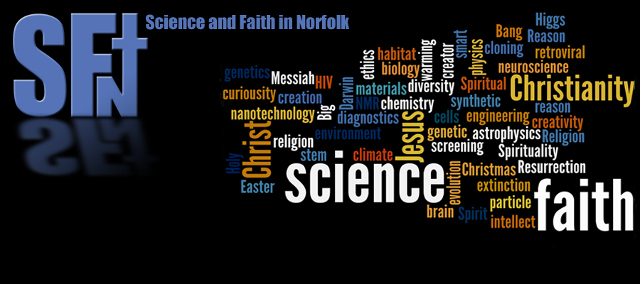
Engaging young people in science-faith discussions
The different viewpoints of science and religious faith can often create anxiety, confusion and bewilderment for young people. This was explored at a recent event in Norwich.
Report by Patrick Richmond and Nick Brewin
Stephanie Bryant regularly goes into schools, leading discussions about science, faith and their interactions in the modern world. She is a member of the Youth and Schools Programme, based at the Faraday Institute for Science and Religion at Cambridge. Their starting point is that young people’s thinking is of crucial importance since they are forming opinions about the Big Questions that will guide them for the rest of their lives.
At a recent meeting in Norwich, Steph identified three key challenges when engaging with students in schools. First, the curriculum tends to separate the teaching of science from philosophy and religious education. Teachers often lack the expertise and confidence to discuss both. Second, there is the pervasive scientism of militant atheists such as Richard Dawkins alleging that “evidence-based science” is the only reasonable basis for knowledge and action. Third, there is the diversity and pluralism of religious traditions compared to the more unified narrative of modern science.
Steph provided a range of comments from bewildered teenagers: “Science and religion are at war: they disagree, and this is making me feel uncomfortable with my religion”; “I want to believe in God, but science is providing new answers”; “I don’t know what to believe”.
She also provided some thoughtful comments from students who are curious about possible interactions between science and faith: “What was before the Big Bang?”; “Does evolution take away the need for God?”; “What is the meaning of life?”; ‘Could robots or aliens be religious?’; ‘What really makes me ‘me’?’
Steph and others like her use science-based activities to illustrate how Christian faith can fit helpfully with a scientific view of the world. The objective is to re-frame popular ideas of science and religion and to begin to correct the view that science and faith must be incompatible.
During the last five years, the Faraday Institute at Cambridge has delivered over 700 sessions to schools, reaching over 20,000 students in the age-range 3 to 18 years. For high-school students, topics include: - “Science, Religion & Ethics: Stem Cells”; “Science, Religion & Human Origins”; “Creation, Evolution and Intelligent Design”; “God, Science and our Amazing Planet”; “Has Science Killed God?”; “What is Science? Is it all we need?”.
Feedback from students has been overwhelmingly positive, for example: - “Interactive and great fun!”; “I wish we had that every day!”; “I now understand how science and religion are compatible.”
Feedback from teachers has been equally enthusiastic: - “The session was positive and thought-provoking, a masterful juxtaposition of science and religion. The speaker was able to engage everyone at a personal level and then build up to eloquent, intellectual ponderings, speaking intelligently on controversial subjects without a hint of confrontation.”
In addition to the programme of school visits and student seminars, a broad range of on-line educational resources is being developed, such as - Learning About Science and Religion” (LASAR); “God and the Big Bang”; Faraday Institute and Faraday Kids; and “Messy Church Science”. Furthermore, the national organisation Christians in Science provides a series of “Thinking About…” leaflets for downloading, tackling a wide range of common questions.
Underlying this entire programme is the recognition that science is not the only reliable source of knowledge. Christian astrophysicist Dr Jennifer Wiseman explains: “Science is limited to characterizing the regular workings of the natural world, and it does this very well. But I believe there are profound truths that science is just not equipped to address, such as questions of purpose, God, meaning, and how we should live our lives.” Atheists like Sir Peter Medawar, a distinguished biologist, agree. The beginning of scientific wisdom, he argues, is an informed and respectful recognition of its limits.
Following Steph’s talk, there was a lively discussion on the problems and possibilities for engaging young people in science-faith discussions. She encouraged everyone – at school and at home – not to be afraid, but to be open-minded. Nobody has a perfect set of answers, but science encourages us to engage, enquire and learn. In response to audience requests, she even resolved to develop more material to help parents and grandparents tackle these issues with their loved ones.
Details of next meeting
The meeting was organised by Science and Faith in Norfolk (SFN), a Norwich-based group which aims to explore the interface between science and religious belief. The next event is a lecture on climate change. Mike Hulme, Professor of Human Geography at Cambridge University, will ask “Who Controls the World’s Climate: God, Nature or People?”. This is the annual Science-Faith Lecture to be held in Norwich Cathedral on Monday 14th October, from 7.00 - 8.30 pm. All are welcome.
For further information, visit the SFN Homepage; or follow SFN on Facebook.
Contact the SFN Secretary, Professor Nick Brewin (07901 884114); sfnorfolk1@gmail.com;